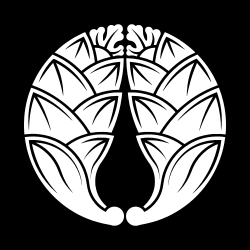茗荷
Japanese
[edit]

Etymology 1
[edit]| Kanji in this term | |
|---|---|
| 茗 | 荷 |
| みょう Hyōgai |
が Grade: 3 |
| on'yomi | |
| Alternative spelling |
|---|
| 蘘荷 (rare) |
/meɡa/ → /meuɡa/ → /mjoːɡa/
From earlier mega (see below).[1][2][3] The kanji spelling is an example of phonetic ateji.[1][3]
Pronunciation
[edit]Noun
[edit]茗荷 or 茗荷 • (myōga) ←めうが (meuga)?
- myoga or Japanese ginger (Zingiber mioga), of which only the shoots and flower buds are used in cooking
- a dimwit, an idiot, a stupid person (from a folk belief that excess consumption of myoga causes forgetfulness)
- a kind of 家紋 (kamon, “family crest”)
Usage notes
[edit]As with many terms that name organisms, this term is often spelled in katakana, especially in biological contexts (where katakana is customary), as ミョウガ.
Derived terms
[edit]- 茗荷の子 (myōga no ko): a myoga flower; a loss when gambling
- 茗荷貝 (myōgagai): a goose barnacle of family Pollicipedidae
Etymology 2
[edit]| Kanji in this term | |
|---|---|
| 茗 | 荷 |
| め Hyōgai |
が Grade: 3 |
| irregular | |
| Alternative spelling |
|---|
| 蘘荷 (rare) |
From Old Japanese [Term?]. Some sources[1][2][3] mention that this might be a compound of 芽 (me, “sprout”) + 香 (ka, “fragrant”). However, the semantics are backwards compared to most other Japanese compounds. In addition, this term appears in writings of the Nara period with the spellings 女我 and 売我.[1] The me syllable here is spelled phonetically with the so-called Type-A or 甲類 (kōrui) reading of e1, but 芽 in Old Japanese had the Type-B or 乙類 (otsurui) reading of e2. These two different e phonetic values were distinct in Old Japanese, indicating that 芽 (me, “sprout”) + 香 (ka, “fragrant”) is not the actual derivation.
(For more details on Old Japanese spellings and phonetic values, see ![]() Jōdai Tokushu Kanazukai on Wikipedia.Wikipedia )
Jōdai Tokushu Kanazukai on Wikipedia.Wikipedia )
This reading is obsolete in modern Japanese.
Pronunciation
[edit]Noun
[edit]References
[edit]- ↑ 1.0 1.1 1.2 1.3 Shōgaku Tosho (1988) 国語大辞典(新装版) [Unabridged Dictionary of Japanese (Revised Edition)] (in Japanese), Tōkyō: Shogakukan, →ISBN
- ↑ 2.0 2.1 2.2 Matsumura, Akira, editor (2006), 大辞林 [Daijirin] (in Japanese), Third edition, Tokyo: Sanseidō, →ISBN
- ↑ 3.0 3.1 3.2 Matsumura, Akira (1995) 大辞泉 [Daijisen] (in Japanese), First edition, Tokyo: Shogakukan, →ISBN
- ^ NHK Broadcasting Culture Research Institute, editor (1998), NHK日本語発音アクセント辞典 [NHK Japanese Pronunciation Accent Dictionary] (in Japanese), Tokyo: NHK Publishing, Inc., →ISBN
- Japanese terms spelled with 茗 read as みょう
- Japanese terms spelled with 荷 read as が
- Japanese terms read with on'yomi
- Japanese terms with IPA pronunciation
- Japanese lemmas
- Japanese nouns
- Japanese terms with multiple readings
- Japanese terms spelled with hyōgai kanji
- Japanese terms spelled with third grade kanji
- Japanese terms with 2 kanji
- Japanese terms spelled with 茗
- Japanese terms spelled with 荷
- Japanese terms read with irregular kanji readings
- Japanese terms inherited from Old Japanese
- Japanese terms derived from Old Japanese
- Japanese terms with obsolete senses
- ja:Ginger family plants


